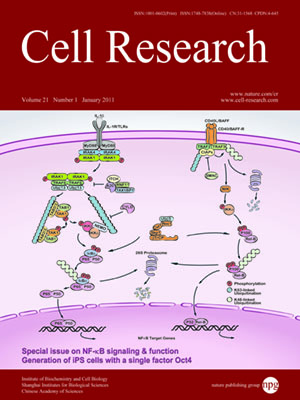
Volume 21, No 1, Jan 2011
ISSN: 1001-0602
EISSN: 1748-7838 2018
impact factor 17.848*
(Clarivate Analytics, 2019)
Volume 21 Issue 1, January 2011: 196-204
ORIGINAL ARTICLES
Generation of iPSCs from mouse fibroblasts with a single gene, Oct4, and small molecules
Yanqin Li1,*, Qiang Zhang1,2,*, Xiaolei Yin1,2, Weifeng Yang1,3, Yuanyuan Du1, Pingping Hou1, Jian Ge1,2, Chun Liu1,2, Weiqi Zhang1, Xu Zhang1,2, Yetao Wu1,2, Honggang Li1,2, Kang Liu1, Chen Wu1,2, Zhihua Song1,2, Yang Zhao1,3, Yan Shi2 and Hongkui Deng1,2
1Department of Cell Biology and Genetics, College of Life Sciences, Peking University, Beijing 100871, China
2Laboratory of Chemical Genomics, School of Chemical Biology and Biotechnology, Shenzhen Graduate School of Peking University, Shenzhen 518055, China
3Beijing Rui Pu Chen Chuang Biotech. Inc., China
Correspondence: Yang Zhao, Yan Shi, Hongkui Deng,(yangel.zhao@gmail.com; shiyan@szpku.edu.cn; hongkui_deng@pku.edu.cn)
The introduction of four transcription factors Oct4, Klf4, Sox2 and c-Myc by viral transduction can induce reprogramming of somatic cells into induced pluripotent stem cells (iPSCs), but the use of iPSCs is hindered by the use of viral delivery systems. Chemical-induced reprogramming offers a novel approach to generating iPSCs without any viral vector-based genetic modification. Previous reports showed that several small molecules could replace some of the reprogramming factors although at least two transcription factors, Oct4 and Klf4, are still required to generate iPSCs from mouse embryonic fibroblasts. Here, we identify a specific chemical combination, which is sufficient to permit reprogramming from mouse embryonic and adult fibroblasts in the presence of a single transcription factor, Oct4, within 20 days, replacing Sox2, Klf4 and c-Myc. The iPSCs generated using this treatment resembled mouse embryonic stem cells in terms of global gene expression profile, epigenetic status and pluripotency both in vitro and in vivo. We also found that 8 days of Oct4 induction was sufficient to enable Oct4-induced reprogramming in the presence of the small molecules, which suggests that reprogramming was initiated within the first 8 days and was independent of continuous exogenous Oct4 expression. These discoveries will aid in the future generation of iPSCs without genetic modification, as well as elucidating the molecular mechanisms that underlie the reprogramming process.
Cell Research (2011) 21:196-204. doi:10.1038/cr.2010.142; published online 19 October 2010
FULL TEXT | PDF
Browse 2572


